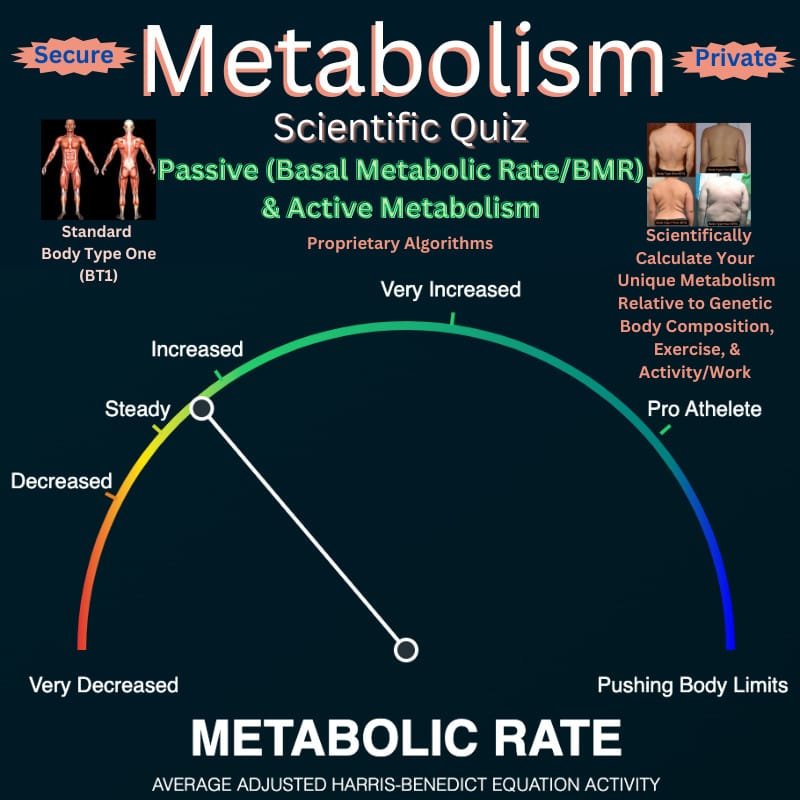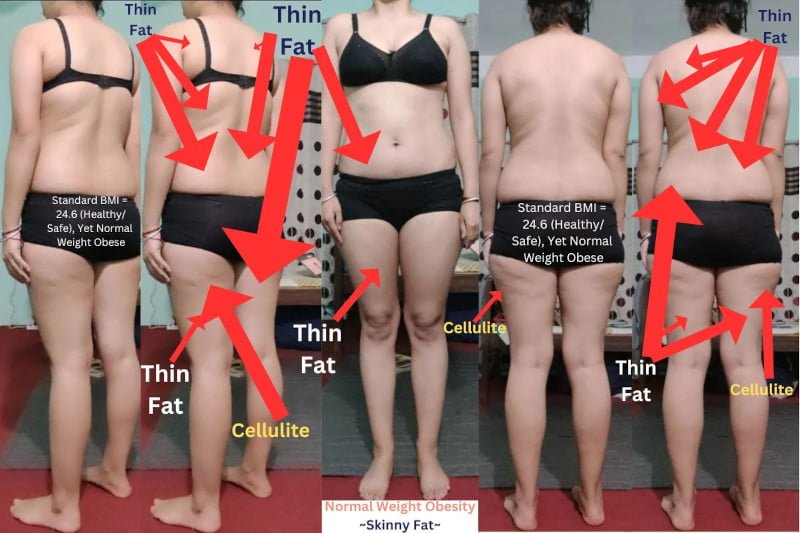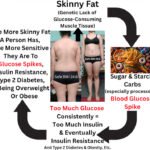How Skinny Fat Affects Metabolism
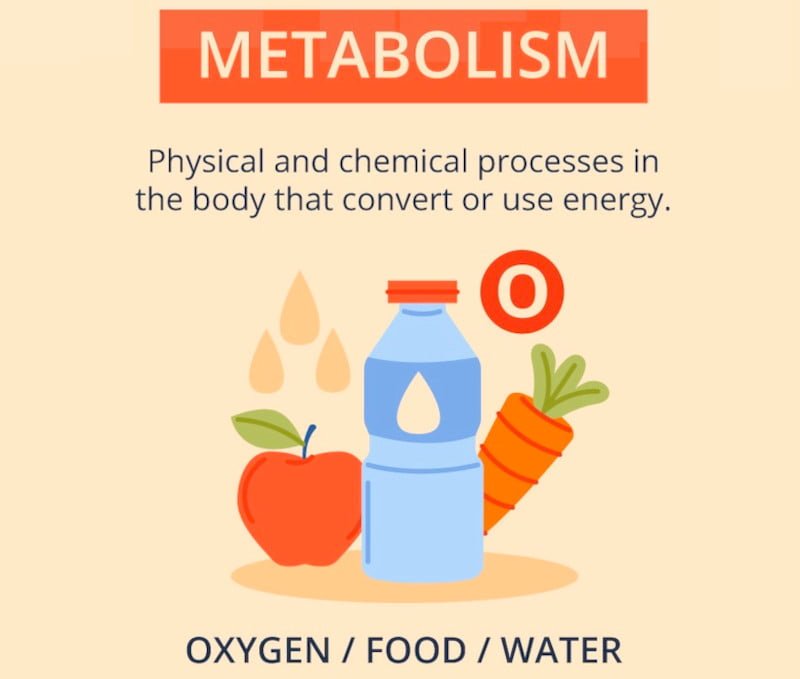
People consistently ask me how skinny fat (lack of genetic muscle tissue) affects metabolism. Is a skinny fat metabolism different than a regular metabolism? What does the current science say?
Metabolism is essentially how the body burns calories. Scientifically, metabolism (1) is defined as, “the whole sum of reactions that occur throughout the body within each cell and that provide the body with energy.” The ‘energy’ is calories. Physical and chemical metabolic reactions/processes include no less than breathing, circulating blood, controlling body temperature, contracting muscles (like the heart), digesting food and nutrients, eliminating waste through urine and feces, and the functioning of the brain and nerves.
Your unique genetic body composition directly influences your specific metabolism. Muscle tissue, at rest and when active, burns calories. Science currently recognizes that one pound of muscle burns roughly 6 calories (2, 3, 4, 5, 6, 7, 84) at rest. The more muscle tissue you have, the stronger/faster your metabolism and the more calories you burn.
Regular White Fat/Yellow Fat (Body Fat, Adipose Tissue), Skinny Fat (Thin Fat and Cellulite Tissue), & Metabolism

Of course, how much regular white/yellow body fat tissue as well as skinny fat tissue (cellulite, thin fat)(8) you have also influences your metabolism. Science currently recognizes that regular fat and skinny fat only roughly burn two to three calories (9, 5, 6) per pound at rest. Which is half to two-thirds less than muscle tissue. The more regular fat and/or skinny fat that you have, the slower/weaker your metabolism and the fewer calories you burn.
Thus, even when you are sitting and doing very little to nothing, your muscle/mass still burns significantly more calories than your regular fat (particularly in excess like with obesity) or skinny fat, if you are experiencing any.
How Skinny Fat Affects Metabolism – The Inaccurate Standard BMI, Standard BMR, and Standard BT1
Science and medicine must have accurate standards (10). The NIH officially recognized the current BMI as the American standard in 1998 (11, 12). Useful as a general guideline, the Standard BMI fails to effectively or efficiently account for genetics, excess muscle/mass (genetic or added via exercise), skinny fat, racial discrepancies, gender differences, age, and the like.
Basal metabolic rate (BMR) is the bare minimum number of calories your unique body requires to function daily. It is generally recognized and accepted in scientific and medical circles that the Mifflin St. Jeor BMR equation (13, 14) is the BMR gold standard for obese and non-obese 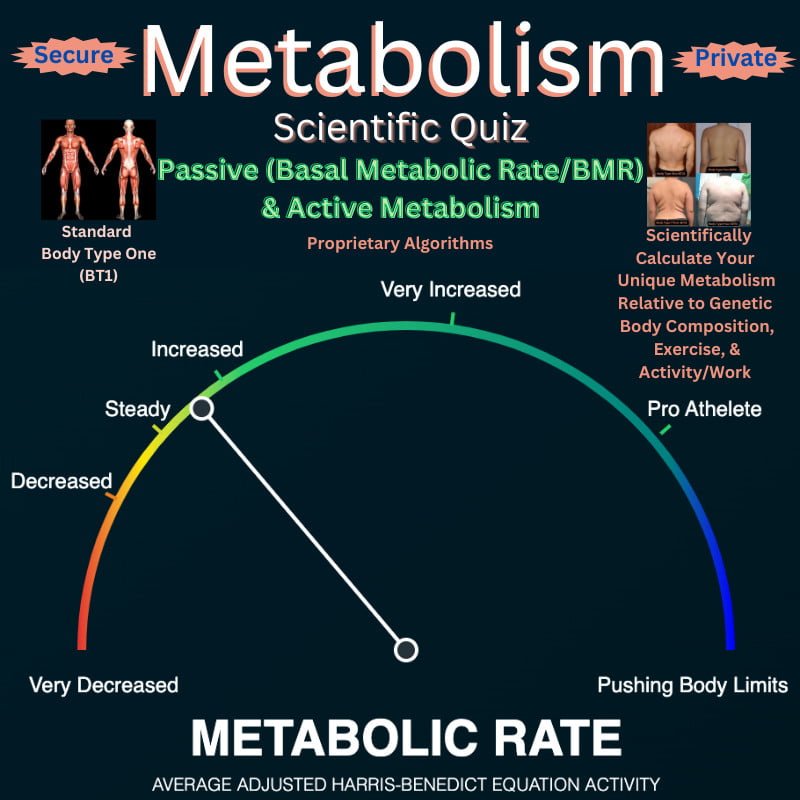 individuals. In terms of Total Daily Energy Expenditure (TDEE), the Revised Harris-Benedict formula (15, 16) is considered the gold standard and calculates your total daily estimated calories burned relative to BMR, all activity, exercise, and body functionality.
individuals. In terms of Total Daily Energy Expenditure (TDEE), the Revised Harris-Benedict formula (15, 16) is considered the gold standard and calculates your total daily estimated calories burned relative to BMR, all activity, exercise, and body functionality.
However, because skinny fat science is so new (8), both the Mifflin St Jeor formula and the Harris-Benedict equation fail to properly account for skinny fat which affects their accuracy. The more skinny fat you have, the more likely your estimated daily Standard BMR and TDEE calories are over-estimated. The Scientific Metabolism Quiz Health Score uses a proprietary algorithm based on the Body Type Science research data (17) to include skinny fat, offering additional Adjusted BMR and TDEE calorie estimates.
The Standard Body Type One (BT1)
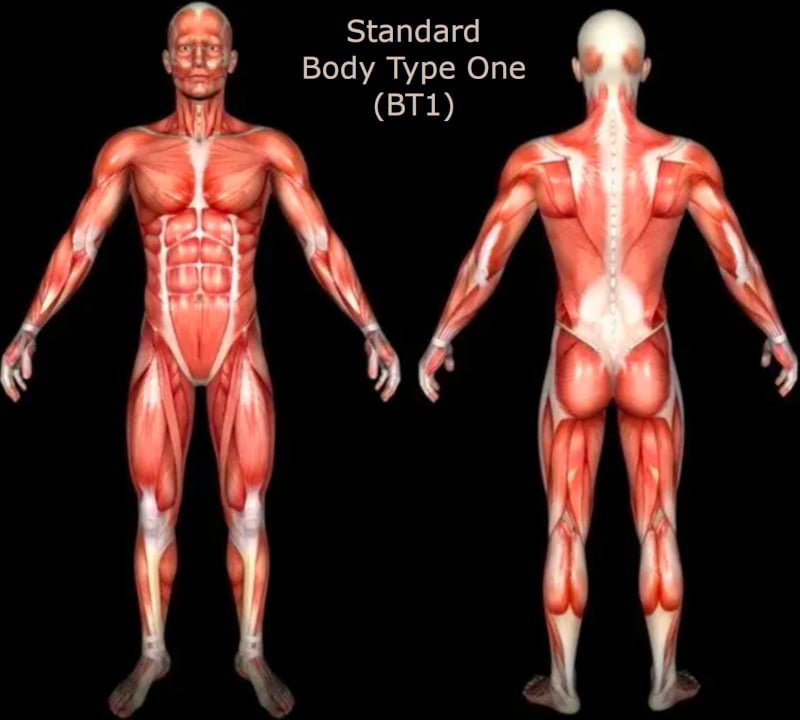
When you go to see your doctor, your body, like all human bodies, is being judged by the Standard Body Type One (BT1) found in any scientifically approved human body anatomy book/resource (18), including all 600+ developed muscles. The Standard BT1 is the only scientific body type recognized by mainstream science and medicine, and thus, every human being is a Body Type One.
If you do not look like a Standard BT1 then you are eating too many calories above Standard BMR/TDEE which has caused you to gain excess regular fat and taken you outside of safe Standard BMI. Once you lose the excess regular fat weight and are within safe BMI again, you are once again a Standard BT1. However, the Body Type Science research data (17) shows that not everyone (19) is born in a Standard BT1 due to genetics — more specifically skinny fat genetics (20) including normal weight obesity, thin fat, and cellulite.
As the global obesity epidemic rages out of control (21, 22, 23) and gets worse (24, 25), mainstream science and medicine continue to hold to outdated, inaccurate standards (19). Regular fat weight loss and gain are directly influenced by unique genetic body composition and metabolism, no less. If people are, indeed, following inaccurate BMR and TDEE calorie estimates that are too high (they are eating too much) while being held to unfair body type (shape) and composition standards, is it any wonder that so many people are experiencing issues with regular fat weight loss and management no matter how hard and diligent they work to lose that excess regular fat weight relative to healthy diet, exercise, and lifestyle routines?
Improving Metabolic Rate – How Skinny Fat Affects Metabolism
If you are genetically blessed with a Standard Body Type One (BT1), and possibly even the ALK skinny gene (26, 27, 28, 29) — especially the younger and healthier you are — then you have a strong/fast metabolism and can likely eat whatever you want while finding it hard to gain weight. But if you are not genetically blessed and instead are experiencing some type of skinny fat tissue like thin fat and/or cellulite, the more you are experiencing the slower/weaker your metabolism. You can reduce skinny fat, but unlike regular fat, you cannot get rid of it.
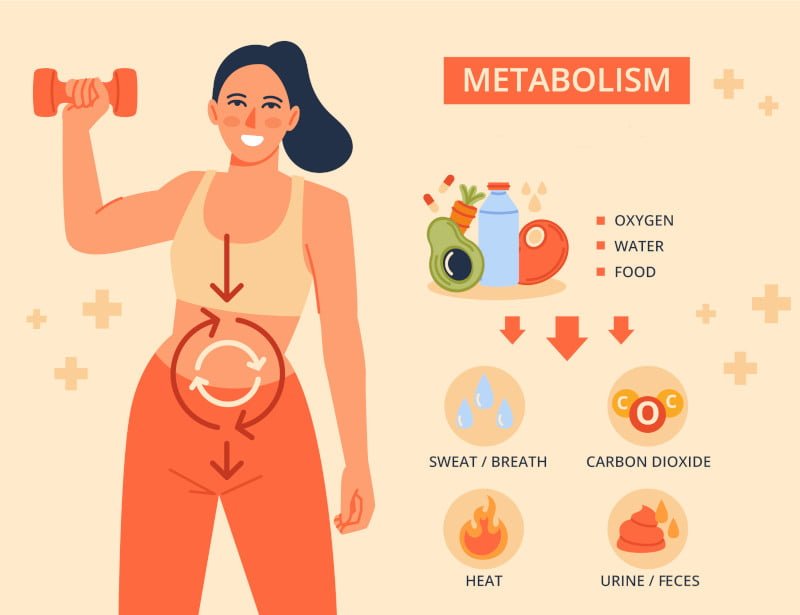
So, your skinny fat metabolism is always at a slight disadvantage, at least.
You can change your unique metrics and improve your VO2max (oxygen uptake) and metabolic rate by exercising (30) regularly and consistently to be as healthy (31, 32, 33, 34) as possible including losing excess regular fat weight, maintaining a safe Standard BMI, eating a healthy diet (35), and living a healthy lifestyle (sleep, stress, etc.)(36).
The Right Amount of Exercise Increases Metabolic Rate
Avoid too much exercise (overtraining syndrome)(37, 38) and too little exercise (metabolic syndrome)(38, 37), as both slow down metabolism while directly influencing the hormone insulin including insulin resistance (which directly affects regular fat weight loss and gain)(35).
The optimal amount (37) of cardio and resistance exercise done consistently and regularly each week can increase metabolic rate (39, 40, 41, 42, 43, 44, 45) from 5 to 10% or more (43, 46, 47, 48). This is particularly true the more muscle mass you add. Which helps burn more calories to assist with regular fat weight loss, no less.
Things That Slow Metabolism (and Some That Increase Metabolism)
1 – Genetics/Body Composition – as mentioned above as well as the fact that muscle is a main insulin-sensitive tissue (85, 86)
2 – Age – the very latest science shows that metabolism peaks (49, 50, 51, 71) around infancy (0.7 years old) and gradually declines by roughly 3% per year (along with Standard BMR calories) and plateaus around the age of 20, it does not really start to slow until around the age of 60 (50, 51, 49, 71) and from that point on it decreases at roughly 0.07% (51, 50, 49, 71) per year
3 – Starvation – eating in a consistent calorie deficit (52, 53, 54, 55, 43), especially eating disorder behavior (anorexia, bulimia, BED, etc.), that is more than 10% – for instance, if your daily BMR is 2000 calories then 250 calories would be more than a 10% deficit (thus a 200-calorie deficit is considered safe for many people, especially the older you get)
4 – Diet – consistently consuming too many unhealthy fast, junk, and processed foods and improper nutrition (35) — although, eating stimulating and spicey foods such as coffee and tea, etc. (caffeine)(64, 65, 66, 67) and capsaicin, found in chili peppers like jalapeño, cayenne, and habanero, and the like, can increase metabolism (68, 69, 64) from 3% maybe up to 11% or so in the very short term (half-hour to 3 hours or so) to temporarily burn more calories – but there is no real evidence (66, 70, 64) that doing so over a long period of time has any lasting effect on metabolic rate, as tolerance builds; the best foods to maintain a healthy metabolism are balanced, clean whole foods
5 – Hydration – being dehydrated can slow metabolism (72, 73, 74, 79), while drinking cold or room temperature water can temporarily (fleeting) speed up metabolism (75, 76, 79) as the body has to warm the water up. Although the research (77, 78, 79) on overhydration is sparse, current indications are that slight overhydration does not slow metabolism, but moderate to severe overhydration may throw metabolic processes out of balance including causing hyponatremia (low blood sodium) which can decrease metabolism.
6 – Sedentariness – not enough exercise and activity (37)
7 – Poor Lifestyle – too little sleep (insulin, leptin, ghrelin, etc.)(36) and too much stress (cortisol, etc.)(36)
8 – Hard Drugs & Alcohol – temporarily, hard drugs like cocaine can increase metabolism, but over time hard drugs (80) slow metabolism, along with alcohol (81)
9 – Allopathic Drugs – some prescription drugs can decrease metabolism (82) including antidepressants, antipsychotics, beta-blockers, and corticosteroids, no less, and some can increase metabolism (83) like obesity and weight loss drugs, to name a few
10 – Hormones – all the above can influence hormones (60, 35) including insulin, leptin, ghrelin, cortisol, estrogen, and testosterone, at least, and hormones directly affect polycystic ovary syndrome (PCOS)(62, 62, 63) and the like.
11 – Thyroid – hypothyroidism can decrease metabolism as much as 40%(56, 57, 59) — although hyperthyroidism (58, 59, 56) can increase metabolism (by as much as 50%)
The Scientific Metabolism Quiz — which posts snapshot Quiz Results (you can take as many times as you want) in your private, anonymous account — allowing you to easily track your metabolic changes as your unique metrics change.
The Best Skinny Fat Lifestyle, According to Science
References
- NIH, National Library of Medicine: Physiology, Metabolism, September 12, 2022, Arturo Sánchez López de Nava; Avais Raja. https://www.ncbi.nlm.nih.gov/books/NBK546690/
- verywell fit: Does Muscle Burn Fat at a Fast Rate?, May 23, 2024, Paige Waehner, CPT (Medically reviewed by Jonathan Valdez, RDN, CDCES, CPT. https://www.verywellfit.com/how-many-calories-does-muscle-really-burn-1231074
- Outlift: How Many Calories Does a Pound of Muscle Burn?, June 4, 2024, Shane Duquette and Marco Walker-Ng, BHSc, PTS. https://outlift.com/how-many-calories-does-a-pound-of-muscle-burn/
- Stronger By Science: How many additional calories does each pound of muscle burn?, June 14, 2023, Greg Nuckols. https://www.strongerbyscience.com/calories-muscle-burn/
- NCSF Foundation: Quiz Policies. https://www.ncsf.org/pdf/ceu/a_pound_of_muscle_burns_30-50_kcal_a_day_really.pdf
- Livestrong: Is It a Myth That Muscle Burns More Calories Than Fat?, Stan Mack. https://www.livestrong.com/article/447243-is-it-a-myth-that-muscle-burns-more-calories-than-fat/
- Los Angeles Times: The myth of ripped muscles and calorie burns, May 16, 2011, James S. Fell. https://www.latimes.com/health/la-xpm-2011-may-16-la-he-fitness-muscle-myth-20110516-story.html
- Skinny Fat Science: What Is Skinny Fat? July 26, 204. https://skinnyfat.fellowone.com/what-is-skinny-fat/
- The Strong Kitchen: How many calories does it take to build a pound of muscle?, January 30, 2024, Rebecca Haight and Lucas Serwinski. https://thestrongkitchen.com/blog/post/how-many-calories-does-it-take-to-build-a-pound-of-muscle
- AMA Journal of Ethics: The Origins and Promise of Medical Standards Of Care, Eleanor D. Kinney, JD, MPH. https://journalofethics.ama-assn.org/article/origins-and-promise-medical-standards-care/2004-12
- Wikipedia: Body mass index, https://en.wikipedia.org/wiki/Body_mass_index
- American Medical Association: AMA adopts new policy clarifying role of BMI as a measure in medicine, June 14, 2023. https://www.ama-assn.org/press-center/press-releases/ama-adopts-new-policy-clarifying-role-bmi-measure-medicine
- Journal of the Academy of Nutrition and Dietetics: Comparison of Predictive Equations for Resting Metabolic Rate in Healthy Nonobese and Obese Adults: A Systematic Review, May 2005, David Frankenfield, MS, RD, Lori Roth-Yousey, MPH, RD, Charlene Compher, PhD, RD. https://www.jandonline.org/article/S0002-8223(05)00149-5/abstract
- NutriAdmin: Mifflin-St Jeor Equation in Nutrition, October 25, 2023, Lucy Domingo, Registered Nutritionist Dietitian. https://nutriadmin.com/blog/mifflin-st-jeor-equation-in-nutrition/
- NIH, National Library of Medicine: Revised Harris–Benedict Equation: New Human Resting Metabolic Rate Equation, January 28, 2023, Eleni Pavlidou, Sousana K. Papadopoulou, Kyriakos Seroglou, and Constantinos Giaginis. https://www.ncbi.nlm.nih.gov/pmc/articles/PMC9967803/
- VeryWellFit: How to Calculate Your Basal Metabolic Rate (BMR), May 20, 2021, Paige Waehner, CPT (Medically reviewed by Vanessa Nzeh, MD). https://www.verywellfit.com/basal-metabolic-rate-1229751
- Fellow One Research: Body Type Science Research Data, https://www.fellowone.com/category/fellow-one-research/the-four-body-types/body-type-science/body-type-quiz/research-data/
- Britannica: human muscle system, July 29, 2024, Robin Huw Crompton and Bernard Wood. https://www.britannica.com/science/human-muscle-system
- KevinMD: Why body type standards are wrong in measuring health, November 4, 2022, Marc Nelson. https://www.kevinmd.com/2022/11/why-body-type-standards-are-wrong-in-measuring-health.html
- Skinny Fat Science: How To Fix Skinny Fat, July 27, 2024. https://skinnyfat.fellowone.com/how-to-fix-skinny-fat/
- Centers for Disease Control and Prevention, CDC: About Obesity, January 23, 2024. https://www.cdc.gov/obesity/php/about/index.html
- National Institute of Diabetes and Digestive and Kidney Diseases: Overweight & Obesity Statistics, https://www.niddk.nih.gov/health-information/health-statistics/overweight-obesity
- World Health Organization/WHO: Obesity and overweight, March 1, 2024. https://www.who.int/news-room/fact-sheets/detail/obesity-and-overweight
- NIH, National Library of Medicine: By 2030, nearly half of all U.S. adults will be obese, experts predict, December 19, 2019, https://www.ncbi.nlm.nih.gov/search/research-news/7943/
- Time: More Than Half of the World Will Be Obese By 2035, March 21, 2023, Report Says, Jeffrey Kluger. https://time.com/6264865/global-obesity-rates-increasing/
- Science Daily: Scientists identify gene linked to thinness that may help resist weight gain, May 21 2020. https://www.sciencedaily.com/releases/2020/05/200521112617.htm
- Genetic Engineering and Biotechnology News: Gene for “Thinness” Identified that May Help to Resist Weight Gain, May 25, 2020. https://www.genengnews.com/news/gene-for-thinness-identified-that-may-help-to-resist-weight-gain/
- News Medical, Life Sciences: Researchers find a ‘skinny’ gene, May 26, 2020, Angela Betsaida B. Laguipo, BSN. https://www.news-medical.net/news/20200526/Researchers-find-a-skinny-gene.aspx
- CNN, Health: Scientists say they may have found a skinny gene, May 21, 2020, Katie Hunt. https://www.cnn.com/2020/05/21/health/thin-gene-trnd-wellness/index.html
- Skinny Fat Science: The Best Skinny Fat Exercise, According to Science, August 2, 2024. https://skinnyfat.fellowone.com/the-best-skinny-fat-exercise-according-to-science/
- WebMD: Understanding Your Metabolism, March 05, 2024, Kendall K. Morgan (Medically Reviewed by Jabeen Begum, MD). https://www.webmd.com/fitness-exercise/what-is-metabolism
- Harvard Health Publishing: The truth about metabolism, June 23, 2024, Reviewed by Howard E. LeWine, MD, Chief Medical Editor. https://www.health.harvard.edu/staying-healthy/the-truth-about-metabolism
- Healthline: 8 Ways That May Speed Up Your Metabolism, January 11, 2024, Helen West, RD (Medically reviewed by Marie Lorraine Johnson MS, RD, CPT). https://www.healthline.com/nutrition/10-ways-to-boost-metabolism
- Harvard Health Publishing: Does metabolism matter in weight loss?, April 16, 2024, Reviewed by Howard E. LeWine, MD, Chief Medical Editor. https://www.health.harvard.edu/does-metabolism-matter-in-weight-loss
- Skinny Fat Science: The Best Skinny Fat Diet, According to Science, July 29, 2024. https://skinnyfat.fellowone.com/the-best-skinny-fat-diet-according-to-science/
- Skinny Fat Science: The Best Skinny Fat Lifestyle, According to Science, August 14, 2024. https://skinnyfat.fellowone.com/the-best-skinny-fat-lifestyle-according-to-science/
- Skinny Fat Science: The Best Skinny Fat Exercise, According to Science, August 2, 2024. https://skinnyfat.fellowone.com/the-best-skinny-fat-exercise-according-to-science/
- Skinny Fat Science: Best Skinny Fat Cardio Exercises, September 11, 2024. https://skinnyfat.fellowone.com/best-skinny-fat-cardio-exercises/
- NIH, National Library of Medicine: The effects of weekly exercise time on VO2max and resting metabolic rate in normal adults, April 28, 2016, Mi-Na Gim, PT, MS1 and Jung-Hyun Choi, PT, PhD. https://www.ncbi.nlm.nih.gov/pmc/articles/PMC4868243/
- Healthline: The Top 10 Benefits of Regular Exercise, November 13, 2023, Arlene Semeco, MS, RD (Medically reviewed by Micky Lal, MA, CSCS,RYT). https://www.healthline.com/nutrition/10-benefits-of-exercise#muscles-and-bones
- Livestrong: How Does Walking Increase Metabolism?, Frank Yemi. https://www.livestrong.com/article/160132-how-does-walking-increase-metabolism/
- Runner’s World: How to Boost Your Metabolism According to Science, October 22, 2020, Selene Yeager. https://www.runnersworld.com/nutrition-weight-loss/a23412133/how-to-boost-your-metabolism/
- Healthline: 6 Mistakes That Slow Down Your Metabolism, November 27, 2023, Franziska Spritzler (Medically reviewed by Jared Meacham, PhD., RD, CSCS). https://www.healthline.com/nutrition/6-mistakes-that-slow-metabolism#TOC_TITLE_HDR_3
- NIH, National Library of Medicine: Impact of energy intake and exercise on resting metabolic rate, August 1990.
- ScienceDirect, The American Journal of Clinical Nutrition: Physical activity as a metabolic stressor, August 2000, Volume 72, Issue 2, Pages 512S-520S, Edward F Coyle. https://www.sciencedirect.com/science/article/pii/S0002916523067291
- EGYM: Top 10 Tips to Boost Your Metabolism and Increase Your Basal Metabolic Rate, https://egym.com/us/blog/boost-metabolism
- NIH, National Library of Medicine: Impact of energy intake and exercise on resting metabolic rate, August 1990.
- ScienceDirect, The American Journal of Clinical Nutrition: Physical activity as a metabolic stressor, August 2000, Volume 72, Issue 2, Pages 512S-520S, Edward F Coyle. https://www.sciencedirect.com/science/article/pii/S0002916523067291
- Harvard Health Publishing, Surprising findings about metabolism and age, October 8, 2021. Fatima Cody Stanford, MD, MPH, MPA, FAAP, FACP, FTOS and Chika Anekwe, MD, MPH, Editorial Advisory Board Member, Harvard Health Publishing. https://www.health.harvard.edu/blog/surprising-findings-about-metabolism-and-age-202110082613
- NBC News: Metabolism in adulthood does not slow as commonly believed, study finds, August 12, 2021, Jacqueline Stenson. https://www.nbcnews.com/health/health-news/metabolism-adulthood-does-not-slow-commonly-believed-study-finds-n1276650
- The Ohio State University: Does metabolism really slow down with age?, March 25, 2022, Beth Harvilla Senior Writer at Ohio State Wexner Medical Center. https://health.osu.edu/wellness/aging/does-metabolism-really-slow-down-with-age
- Michigan Medicine (University of Michigan): Weighing the Facts: The Tough Truth About Weight Loss, April 12, 2017, Marschall S. Runge, M.D., Ph.D. https://www.michiganmedicine.org/health-lab/weighing-facts-tough-truth-about-weight-loss
- NIH, National Library of Medicine: Metabolic response to short-term 4-day energy restriction in a controlled study, March 206, Katsuyasu Kouda, Harunobu Nakamura, Hirao Kohno, Toyoko Okuda, Yuko Higashine, Keiji Hisamori, Hiroyasu Ishiha, Rikio Tokunaga, and Yoshiaki Sonoda. https://pmc.ncbi.nlm.nih.gov/articles/PMC2723638/
- NIH, National Library of Medicine: Impact of calorie restriction on energy metabolism in humans, February 11, 2020. Jasper Most and Leanne Maree Redman. https://pmc.ncbi.nlm.nih.gov/articles/PMC9036397/
- NIH, National Library of Medicine: Effect of a high-protein, very-low-calorie diet on resting metabolism, thyroid hormones, and energy expenditure of obese middle-aged women, February 1987, K Barrows and J T Snook. https://pubmed.ncbi.nlm.nih.gov/3812338/
- ScienceDirect, Neuroscience: Basal Metabolic Rate, https://www.sciencedirect.com/topics/neuroscience/basal-metabolic-rate
- Cleveland Clinic: Hypothyroidism (Underactive Thyroid), September 24, 2024. https://my.clevelandclinic.org/health/diseases/12120-hypothyroidism
- Mayo Clinic: Hyperthyroidism (overactive thyroid), November 30, 2022. https://www.mayoclinic.org/diseases-conditions/hyperthyroidism/symptoms-causes/syc-20373659
- American Thyroid Association: Thyroid and Weight, https://www.thyroid.org/thyroid-and-weight/
- Healthline: 9 Hormones That Affect Your Weight — and How to Improve Them, February 1, 2023, Ellen Landes, MS, RDN, CPT (Medically reviewed by Jerlyn Jones, MS MPA RDN LD CLT, Nutrition). https://www.healthline.com/nutrition/9-fixes-for-weight-hormones
- NIH, National Library of Medicine: Basal metabolic rate is decreased in women with polycystic ovary syndrome and biochemical hyperandrogenemia and is associated with insulin resistance, July 2009, Neoklis A Georgopoulos, Alexandros D Saltamavros, Vasiliki Vervita, Kyriakos Karkoulias, George Adonakis, George Decavalas, George Kourounis, Kostas B Markou, and Venetsana Kyriazopoulou. https://pubmed.ncbi.nlm.nih.gov/18678372/
- WebMD: Polycystic Ovary Syndrome (PCOS) and Weight Gain, March 2, 2023, Stephanie Watson (Medically reviewed by Nivin Todd, MD). https://www.webmd.com/women/polycystic-ovary-syndrome-pcos-and-weight-gain
- NIH, National Library of Medicine: Metabolic dysfunction in polycystic ovary syndrome: Pathogenic role of androgen excess and potential therapeutic strategies, February 5, 2020, Miguel A Sanchez-Garrido and Manuel Tena-Sempere. https://pmc.ncbi.nlm.nih.gov/articles/PMC7115104/
- Healthline: Can Coffee Increase Your Metabolism and Help You Burn Fat?, October 23, 2023, Kris Gunnars, BSc. https://www.healthline.com/nutrition/coffee-increase-metabolism
- NIH, National Library of Medicine: Normal caffeine consumption: influence on thermogenesis and daily energy expenditure in lean and postobese human volunteers, January 1989, A G Dulloo , C A Geissler, T Horton, A Collins, and D S Miller. https://pubmed.ncbi.nlm.nih.gov/2912010/
- NIH, National Library of Medicine: The effects of green tea consumption on metabolic and anthropometric indices in patients with Type 2 diabetes, December 2013, Ateke Mousavi, Mohammadreza Vafa, Tirang Neyestani, Mohammadebrahim Khamseh, and Fatemeh Hoseini. The effects of green tea consumption on metabolic and anthropometric indices in patients with Type 2 diabetes https://pmc.ncbi.nlm.nih.gov/articles/PMC3908530/
- NIH, National Library of Medicine: Comparison of changes in energy expenditure and body temperatures after caffeine consumption, 1995, P Koot and P Deurenberg. https://pubmed.ncbi.nlm.nih.gov/7486839/
- BusinessInsider: 5 science-backed benefits of eating spicy food and how it can help you burn calories and live longer, November 13, 2020, Erin Heger. https://www.businessinsider.com/guides/health/diet-nutrition/is-spicy-food-good-for-you
- WebMD: Health Benefits of Chili, Chili Peppers, and Chili Powder, March 8, 2024, WebMD Editorial Contributors Sarah Vanbuskirk and Kristin Mitchell (Medically reviewed by Jabeen Begum, MD). https://www.webmd.com/diet/health-benefits-chili-peppers
- ScienceDirect: Effect of dihydrocapsiate on resting metabolic rate in humans, November 2010, Volume 92, Issue 5, Pages 1089-1093, Galgani Jose E and Ravussin Eric. https://www.sciencedirect.com/science/article/pii/S0002916523129169
- American Osteopathic Association: Metabolism remains steady from about age 20 to 60, Science research finds, September 15, 2021, Alexander Ford, DO, RD. https://thedo.osteopathic.org/2021/09/metabolism-remains-steady-from-about-age-20-to-60-science-research-finds/
- Cleveland Clinic: Metabolism, November 20, 2024. https://my.clevelandclinic.org/health/body/21893-metabolism
- University of Utah Health: Is Eight Enough? U Researcher Says Drink Up and Tells Why, June 14, 2003. https://healthcare.utah.edu/press-releases/2003/01/eight-enough-u-researcher-says-drink-and-tells-why
- Oxford University Press, The Journal of Clinical Endocrinology and Metabolism, Lipopolysaccharide-Binding Protein Plasma Levels in Children: Effects of Obstructive Sleep Apnea and Obesity Get access Arrow, February 1, 2014. Leila Kheirandish-Gozal, Eduard Peris, Yang Wang, Maximiliano Tamae Kakazu, Abdelnaby Khalyfa, Alba Carreras, and David Gozal. https://academic.oup.com/jcem/article-abstract/99/2/656/2537054?redirectedFrom=fulltext&login=false
- NIH, National Library of Medicine: Water-induced thermogenesis, December 2003, Michael Boschmann, Jochen Steiniger, Uta Hille, Jens Tank, Frauke Adams, Arya M Sharma, Susanne Klaus, Friedrich C Luft, and Jens Jordan. https://pubmed.ncbi.nlm.nih.gov/14671205/
- John Hopkins: Yes, drinking more water may help you lose weight, January 15, 2020. https://hub.jhu.edu/at-work/2020/01/15/focus-on-wellness-drinking-more-water/
- WebMD: Overhydration: How Much Water Is Too Much?, June 21, 2024, Tammy Worth (Medically reviewed by Jabeen Begum, MD). https://www.webmd.com/diet/what-is-too-much-water-intake
- News-Medical, Life Sciences: Overhydration / Hyponatremia, February 27, 2019, HH Patel (Reviewed by Angela Betsaida B. Laguipo, BSN). https://www.news-medical.net/health/Overhydration-Hyponatremia.aspx
- NIH, National Library of Medicine: Effects of Hyponatremia on the Brain, October 28, 2014, Corinna Giuliani and Alessandro Peri. https://pmc.ncbi.nlm.nih.gov/articles/PMC4470176/
- NIH, National Library of Medicine: Drug abuse results in metabolic and epigenetic changes in body which may contribute to disease risk: Role of L-carnitine and nutrients, January 18, 2023, Mohamed Ashraf Virmani. https://pmc.ncbi.nlm.nih.gov/articles/PMC10880790/
- GoodRX: How Alcohol Affects Your Metabolism, January 23, 2025, Brian Clista, MD (Reviewed by Sarah Gupta, MD). https://www.goodrx.com/conditions/weight-loss/how-alcohol-affects-metabolism
- WebMD: 15 Things That Slow Your Metabolism, January 28, 2023, Kelli Miller (Medically reviewed by Carol DerSarkissian, MD). https://www.webmd.com/obesity/ss/slideshow-slow-metabolism
- NIH, National Library of Medicine: Pharmacologic Treatment of Overweight and Obesity in Adults, August 20, 2024. Beverly G. Tchang, MD, Mohini Aras, MD, Rekha B. Kumar, MD, MS, and Louis J. Aronne, MD. https://www.ncbi.nlm.nih.gov/books/NBK279038/
- Self: How Much Does Strength Training Really Increase Metabolism?, September 21, 2017. K. Aleisha Fetters, M.S., C.S.C.S.https://www.self.com/story/how-much-does-strength-training-really-increase-metabolism
- Skinny Fat Science: Is Muscle/Mass Genetic and How Does It Affect Skinny Fat?, November 20, 2025. https://skinnyfat.fellowone.com/skinny-fat-science/is-muscle-mass-genetic-and-how-does-it-affect-skinny-fat/
- Skinny Fat Science: The Best Skinny Fat Diet, According to Science, July 29, 2024. https://skinnyfat.fellowone.com/skinny-fat-science/the-best-skinny-fat-diet-according-to-science/

